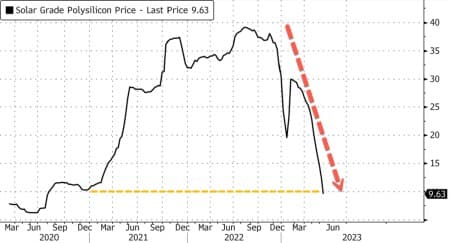- The average price of solar silicon fell 22% to $9.6 a kilogram, the lowest level since the summer of 2020, due to overproduction of polysilicon.
- Overproduction led to a glut, forcing some manufacturers to sell polycrylic at a loss, while others stopped production to avoid further losses.
- The price correction is due to new capacity from major global producers, and BloombergNEF expects prices to stabilize in the third quarter as production disruptions reduce supply pressure.
Real prices for a key component of solar PV systems are falling sharply and rapidly , which is caused by an oversupply in China's solar panel supply chain. Some polycrylic companies are making unprofitable solar panels, while others have stopped production.
Bloomberg data showed the average price of solar silicon fell 22% from last week to $9.6 a kilogram, hitting a level not seen since the summer of 2020. Prices were at $39 in June 2022 and have fallen 75.5% since then.

The main reason for the decline is that "polycrylic production is well ahead of the planned global installation," according to BloombergNEF.
PV Infolink data showed silicon prices were even lower at $7.50 a kilogram. Some producers are selling polysilicon to reduce market inventories amid a worsening glut.
Some producers, such as Daqo New Energy Corp., want $7.55 a kilogram. Bloomberg quoted the China Silicon Industry Association as saying, "Some factories have suspended production to avoid selling at a loss."
Citigroup wrote in a note to clients that polycrylic prices are close to the industry's cost of production average after a year of declines, adding that the price correction is due to capacity increases by most of the world's top producers.
Citigroup analyst Pierre Lau noted that market prices for masses, cells and modules also fell due to lower polycrylic costs, while solar glass prices remained flat.
He noted that three polysilicon producers have suspended production due to low prices and that the timetable for recovery has not yet been specified.
BloombergNEF expects polycrimium prices to stabilize in the third quarter as production disruptions help ease supplies.
Production ended up outpacing demand growth as prices for polysilicon-cooled solar panels rose in the Covid era.
At Zerohedge.com
Further reading on Oilprice.com:
Return to the main page



